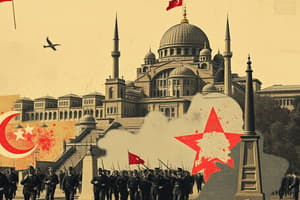Podcast
Questions and Answers
What was a primary purpose of Christian missions established during the nineteenth century in the Ottoman Empire?
What was a primary purpose of Christian missions established during the nineteenth century in the Ottoman Empire?
- To promote traditional Ottoman values
- To support local governance within Ottoman regions
- To educate Ottomans in Islamic teachings
- To act as agents of European powers and disseminate Western culture (correct)
Which ideologies did the Ottomans adopt to counter the rise of ethnic-linguistic nationalism?
Which ideologies did the Ottomans adopt to counter the rise of ethnic-linguistic nationalism?
- Pan-Arabism and Liberalism
- Nationalism and Imperialism
- Pan-Turkism, Ottomanism, and Pan-Islamism (correct)
- Socialism and Secularism
What was a significant action taken by Mahmud II to modernize the Ottoman military?
What was a significant action taken by Mahmud II to modernize the Ottoman military?
- Forming alliances with neighboring empires
- Destruction of the Janissars (correct)
- Establishing a paramilitary organization
- Importing advanced naval technology
What was the primary aim of the Pan-Islamism movement within the Ottoman Empire?
What was the primary aim of the Pan-Islamism movement within the Ottoman Empire?
What was the Tanzimat period known for in the context of the Ottoman Empire?
What was the Tanzimat period known for in the context of the Ottoman Empire?
What were the major interests of England regarding the Ottoman Empire?
What were the major interests of England regarding the Ottoman Empire?
Which event marked the significant interest of France in the Ottoman Empire during the 19th century?
Which event marked the significant interest of France in the Ottoman Empire during the 19th century?
How did Germany's approach to the Ottoman Empire differ from other powers during the late 19th century?
How did Germany's approach to the Ottoman Empire differ from other powers during the late 19th century?
What was one of the consequences of Italy's declaration of war against the Ottoman Empire in 1911?
What was one of the consequences of Italy's declaration of war against the Ottoman Empire in 1911?
What type of external influences contributed to the decline of the Ottoman Empire?
What type of external influences contributed to the decline of the Ottoman Empire?
Flashcards are hidden until you start studying
Study Notes
The Ottoman Empire - Key Players and Interests
- England sought to preserve the Ottoman Empire's integrity to contain Russian expansionism and maintain its imperial communications route.
- England strategically acquired Malta, Aden, and Cyprus, securing key locations for its empire.
- England became increasingly interested in Egypt following the opening of the Suez Canal in 1869 and the weakening of the Ottoman Empire's control over the country.
- France allied with England against Russia, seeking to curb Russian expansionism.
- France spread its influence in the Ottoman Empire through various means, including exploiting the non-payment of debt, intervening in conflicts (e.g., between the Druze and Maronite communities in Mount Lebanon), and establishing protectorates in Morocco.
- Germany emerged as a power player in the Ottoman Empire, focusing on commercial and financial interests rather than territorial gains.
- Germany’s lack of territorial ambitions gave it an edge in commercial and financial dealings, directly impacting its involvement in World War I when the empire joined the German side.
- Italy, post-unification, targeted the North African coast.
- Italy, seeking expansion, declared war on the Ottoman Empire in 1911, occupying Libya and the Dodecanese Islands.
- Italy was involved in establishing protectorates in Morocco along with France and Spain.
Introduction of Western Models in the Ottoman Empire
- Western influences started penetrating the Ottoman Empire during the 19th century, introducing European ideas, policies, and methodologies through various channels.
- European missionaries, diplomats, teachers, administrators, and military personnel actively introduced Western models.
- The Young Ottomans, students educated in Europe, brought back Western ideas and contributed to the emergence of an intellectual and educational movement.
- Sultan Selim III spearheaded the adoption of European technology, particularly in the military domain.
- Mahmud II, Sultan Selim III’s successor, carried forward the modernization reforms by dismantling the Janissaries in 1826, paving the way for the creation of a modern, European-style military.
- The Tanzimat era (New Order, 1839-1876) extended these reforms to various sectors of Ottoman society, marking a significant shift in governance and administration aimed at modernizing the Empire along Western lines.
Arab Nationalism: An Emerging Force
- The 19th century saw the rise of nationalism in the Ottoman Empire, with the idea of a nation based on ethnicity and language gaining traction.
- To counteract rising pressures for independence and autonomy, the Ottomans adopted three primary ideologies to manage their diverse ethnicities, cultures, and religions:
- Pan-Turkism aimed to unite all Turkish populations under the Ottoman dynasty, primarily gaining traction in the Balkans against Russian expansion.
- Ottomanism aimed to create a single nationality within the empire, encompassing various ethnic groups and religions, effectively a supranational nationalist movement. European powers often manipulated this policy to secure concessions for minority communities.
- Pan-Islamism emerged as a response to the shortcomings of Ottomanism. It aimed to unite Muslim communities across the empire, with the Ottoman Empire serving as the ultimate symbol of Islamic unity (Umma).
The Decline of the Ottoman Empire: A Complex Web of Factors
- Technological backwardness compared to Europe contributed to the Ottoman Empire's decline.
- Shifting global trade routes and the rise of European capitalism further weakened the empire's economic standing.
- The Capitulation Regime, granting foreign powers significant privileges within the Ottoman Empire, significantly diminished its sovereignty and economic power.
- The "Eastern Question" – a diplomatic stalemate among European powers over the division of the Ottoman Empire, fueled by competing interests and ambitions, resulted in instability and prolonged the empire's decline.
- The Ottoman Empire was often referred to as the "Sick Old Man of Europe" due to its internal weaknesses and decreasing political, economic, and military strength.
Colonial European Penetration into the Ottoman Empire: A Timeline of Key Events
- Treaty of Carlowitz (1699): The Ottoman Empire lost Romania and significant portions of Hungary to the Austro-Hungarian Empire.
- Treaty of Kuchuk Kainaryi (1774): Russia gained access to the Black Sea, secured free trade and navigation, and acquired control of the Bosphorus Straits, along with being granted the protection of Ottoman Orthodox Christians.
- Napoleonic Invasion of Egypt (1798): Napoleon's invasion disrupted the communication route between England and its Indian empire. Despite being expelled by the British in 1801, the invasion left a French influence in Egypt, propagating the ideas of the French Revolution.
- Treaty of St. Stefano (1878): Serbia, Romania, and Montenegro achieved independence from the Ottoman Empire. A larger Bulgarian territory, encompassing Bulgaria, Rumelia, and Macedonia, was established, gaining autonomy. However, this treaty was later revised by the Treaty of Berlin.
- Treaty of Berlin (1878): The larger Bulgarian territory stipulated in the Treaty of St. Stefano was divided into three parts: The northern area proclaimed as an independent state. Eastern Rumelia in the south and a significant portion of Macedonia in the southwest remained under Ottoman influence. The independence of Romania, Serbia, and Montenegro was recognized, though with reduced territories, and Serbia and Montenegro were separated by a Muslim region, the Vilayate of Novi Pazar.
Russia's Ambitions: Seeking Hegemony
- Russia viewed itself as the heir to the Byzantine Empire (the Third Rome), aiming to control the Black Sea and the Mediterranean Sea. Since Peter the Great's era, Russia had been aggressively pursuing its expansionist goals, viewing the weakening Ottoman Empire as a prime target for gaining critical strategic locations and expanding its sphere of influence.
Studying That Suits You
Use AI to generate personalized quizzes and flashcards to suit your learning preferences.




